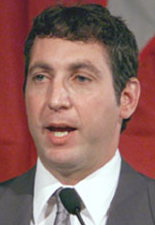
Leonard Asper
 Leonard Asper | |
|
Nonsense to deny role in Holocaust Edmonton Journal Wednesday, March 24, 2004 Re: "To deport? Or not?" Journal, March 20. I have major concerns with Marco Levytsky's article regarding deportation of an alleged Ukrainian war criminal. Levytsky's article seems to deny acceptance by Ukrainians for participation in the destruction process. Levytsky's article implies that few, if any, Ukrainians played a role in the destruction process and that the "Trawnicki men" were oppressed and forced into the job of killing innocent Jews. Raul Hilberg, in his seminal book on the Holocaust, The Destruction of the European Jews, states that "The Ukrainians were involved in the fate of the Polish Jewry as perpetrators. The SS and police employed Ukrainian forces in ghetto-clearing operations ... . The Ukrainians had never been considered pro-Jewish." Christopher Browning in The Path to Genocide points out that the "dirty work" such as "driving Jews out of their dwellings with whips, clubs and guns; shooting on the spot the frail, sick, elderly, and infants ... was usually left to the Hiwis from Trawnicki." There are too many references, pictures, documents and admissions about the roles played by the so-called Hiwis. Given such evidence, denial seems absurd. Ukrainians, and other eastern Europeans, played an extensive role in the final solution. Eastern European nations, and Ukrainians, seem to struggle with coming to terms with the role many of their citizens played in the final solution. Denial of the participation in atrocities, no matter how long ago, is at best self-serving and at worst, evil. Lee James Olesen, St. Albert www.canada.com/edmonton/edmontonjournal/news/archives/story.html?id=f499a17a-c128-4ffa-87ea-3a56529c02f5 |
|
Lee James Olesen (Letter 24-Mar-2004) offering the following Raul Hilberg
quotation presents a misleading picture for two reasons: "The Ukrainians
were involved in the fate of Polish Jewry as perpetrators. The SS and
police employed Ukrainian forces in ghetto-clearing operations.... The
Ukrainians had never been considered pro-Jewish." First, unlike Olesen, Hilberg capitalizes "Police" in that statement because he has in mind the Jewish Ghetto Police, or Ordnungsdienst, which is evident throughout Hilberg's discussion of ghetto-clearance as when he says "Jewish police themselves were frequently used to assist in these operations" (p. 486) or "Each Jewish policeman was told to bring seven people for deportation each day or face 'resettlement' himself. Now every policeman brought whomever he could catch � friends, relatives, even members of his immediate family" (p. 505). Second, reading to the end of Hilberg's paragraph finds him noting, as he does throughout his work, that Ukrainian participation in the Jewish holocaust was reluctant and minimal: "On the other hand, these people had no stomach for the long-range systematic German destruction process. Short violence followed by confession and absolution was one thing, organized killing was quite another" (p. 519). Mr. Olesen performs no service to truth by his biased and out-of-context quoting. In fact, Ukrainians do not have any trouble "coming to terms with" Ukrainian collaboration with the Nazis, as this collaboration reached a reprehensible degree in perhaps one Ukrainian out of every ten thousand. Nor does the picture of a Ukrainian force ghetto-clearing under Jewish command, or the Jewish police handing over family members to the Nazis, call to mind only the question of whether Ukrainians have come to terms with their collaboration. Lubomyr Prytulak, Ph.D. Ukrainian Archive [address] [telephone] [email] |